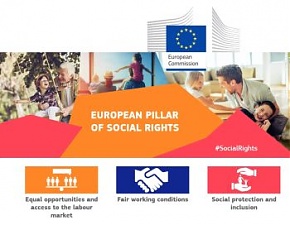
All rights reserved.
You may not copy, reproduce, republish, or otherwise use www.baltic-course.com content
in any way except for your own personal, non-commercial use.
Any other use of content requires the hyperlink to www.baltic-course.com.

Printed: 23.04.2024.
 PrintEuropean Pillar of Social Rights: better working and living conditions in EU and Baltics
PrintEuropean Pillar of Social Rights: better working and living conditions in EU and Baltics
 |
|---|
During
April-June 2017, social partners had the occasion to express their views on
both topics. Now, the second stage consultation on the modernisation of labour
contract rules has started, and the one on access to social protection will
follow soon. This second stage consultation builds upon the outcome of the
first phase discussions.
In
April 2017, the Commission presented the European Pillar of Social Rights in
two legal forms: Commission’s Recommendation and as a proposal for a joint
proclamation by the Parliament, the Council and the Commission.
The
final version of the European Pillar of Social Rights (it consists of 20
principles and rights) is aimed at achieving agreement concerning better
working and living conditions across the EU. In order to deliver on the
Pillar’s circumstances, Commission also presented a legislative proposal to
improve work-life balance of working parents and dependants as well as
launching a first stage of two social partner consultations: one to modernise
the rules on labour contracts, and another one on access to social protection
for all.
Present Commission made a “more social Europe” as one of
its priorities from the very beginning; it was reflected in Political Guidelines of
July 2014. In September 2015, in the first President Juncker's State
of the Union, he underlined the need to step up work for a fair and truly
pan-European labour market. As part of these efforts, the Commission wants to
develop a European Pillar of Social Rights, which takes account of the changing
European social realities.
In the State of the Union address (September
2017), the President confirmed the Commission’s commitment to move
forward with the Pillar as an essential means to create a deeper, fairer and
more social internal market. Thus he underlined that in order to avoid social fragmentation and social dumping in Europe, the member states should agree on the European Pillar of Social Rights
as soon as possible (as the latest at the Gothenburg summit in November 2017).
However,
national social systems will remain diverse and separate for a long time; but
the new “European Social Standards Union” will make a
common understanding of what is socially fair.
Vice-President responsible for the Euro, Social
Dialogue, Financial Stability, Financial Services and Capital Markets Union, Valdis Dombrovskis underlined in Brussels
(25 September 2017) that the role of social partners has been central in the process to adopt the
European Pillar of Social Rights. It is particularly important, he stressed, to
address challenges related to new forms of employment and provides adequate
working conditions in so-called atypical forms of employments. Clear rules and common fair employment standards can
ultimately protect companies that provide workers with adequate information on
their working conditions. He added that the Commission’s proposal is aimed at balancing
essential protection for workers with companies’ scope for job creation and
labour market innovation.
Commissioner for Employment, Social Affairs, Skills and
Labour Mobility, Marianne Thyssen, added that workers in the EU have the
right to be informed in writing at the start of employment about their rights
and obligations. But millions of Europeans working in non-standard contracts
are uncertain about their rights. The Commission’s idea is to cover all workers
in the EU states by these basic rules, independent of their employment status
and regardless of whether they are ICT workers or delivery people. Ensuring
fairer and more predictable employment contracts is a basis for fair working
conditions among the EU states.
The Commission wants to broaden the scope of the current
Directive on employment contracts (the so-called Written Statement
Directive, see below), extending it to new forms of employment, such
as on-demand workers, voucher-based workers and platform workers, so that no
one is left behind. The current rules should also be modernised, taking account
of developments on the labour market in the past decades. By improving the
timeliness and information that is given at the start of an employment
contract, workers will be better aware of their rights, and therefore more able
to enforce these rights. For employers, bringing the rules up to date will
bring more legal clarity and certainty and will avoid unfair competition.
Social partners will be able to share their views on the
envisaged updates of EU legislation on employment contracts until 3 November
2017. The Commission aims to present a legislative proposal before the end of
the year. The Social Summit for Fair Jobs and Growth will take place in
Gothenburg, Sweden, on 17 November 2017. https://www.socialsummit17.se/
Additional information in: = MEMO/17/3366; = Factsheet on the Social dimension of Europe – overview of initiatives since the start of the Juncker Commission; = Second stage consultation on the Written Statement Directive; = Website on the European Pillar of Social Rights. Source: http://europa.eu/rapid/press-release_IP-17-3367_en.htm?locale=en
“Written Statement Directive” and labour contracts’ modernisation
The Written Statement Directive exists since 1991 and gives
employees starting a new job the right to be notified in writing of the
essential aspects of their employment relationship. The aim of this Directive
is to make sure workers are aware of their rights. The world of work has been
changing rapidly and new forms of work have emerged. As a consequence, the
current Directive no longer covers all types of employment relationships. Under
the framework of the European Pillar of Social Rights, the Commission therefore
launched a social partner consultation to revise the Directive, so that it
would reflect labour market changes.
The Commission’s evaluation of the Directive has shown that many workers in the EU do not receive a written confirmation of their working conditions or do not receive all the information they need in a timely manner, including domestic workers and those who perform on-call work. Moreover, whatever the level of information provided to workers, some practices in some precarious labour relationships may be detrimental to workers, especially as regards casual work. According to a report by the European Foundation for the Improvement of Living and Working Conditions (Eurofound), casual work (such as zero-hour contracts) raises particular concerns about working conditions and is characterised by low levels of job and income security.
Suggested changes to the Directive
Three areas for action are considered: first, the scope of the directive could be clarified, encompassing all
workers, including those on short-term assignments or those having new and
atypical employment relationships.
Second, the revision could reinforce the principle of
written information about applicable working conditions and update the list of
required elements, for instance with the working schedule, conditions of a
probation period or overtime.
Third, beyond proper information in writing in a
timely manner, the modernised rule could also establish some basics right such
as the right to a degree of predictability of work for workers with very
flexible contracts or the right to a maximum duration of a probation period.
Consulting social partners
According to the Treaty of the Functioning of the European
Union (art. 154 TFEU), the Commission has the duty to consult
European social partners prior to presenting any legislative proposal in the
social field. The consultation must follow a compulsory two-stage procedure. In
the first stage the Commission consults the social partners on the possible
direction of an initiative. In the second stage, the focus is on the content of
an initiative. This process gives the European social partners the possibility
to be directly involved and influence the drafting of social proposals.
Moreover, social partners may suspend the Commission initiative whilst deciding
to enter into negotiations themselves. If this does not happen, the Commission
can review the current Directive. The Commission intends to propose a revision
of this directive by the end of the year.
The first stage consultation of social partners showed
diverging views from workers and employers organisations. While the worker's
organisations agreed with the need to enhance the effectiveness of the Written
Statement Directive and the goal to improve the working conditions for
vulnerable workers, a large majority of employers' organisations rejected those
ideas. Therefore the social partners were not in a position to initiate
formally the joint negotiation process provided for in art. 155 TFEU. However,
they reserved the possibility to do so in the context of the second phase
consultation.
Delivering on the European Pillar of Social Rights
On 26 April 2017, along the presentation of the European Pillar of Social Rights*), the Commission put
forward a number of initiatives related to work-life balance, the information
of workers, access to social protection and working time. They all aim at
different aspects of the Pillar. The package includes in particular a
legislative proposal for a Directive on Work-Life Balance for Parents and Carers to
give families real choices when the birth of a child or a close relative in
need of care make more flexible working arrangements necessary. The proposed
measures are intended in particular to increase possibilities for men to take
up parental and caring responsibilities. This will benefit children and help
increase women's participation in the labour market, thereby reducing the
difference between men and women in employment which stood in 2015 still at
11.6%p and increases even to 30% when families have young children under the
age of 6. This proposal is now under discussion in the European Parliament and
Council.
*) The European Pillar of Social Rights
sets out a number of key principles and rights to support fair and
well-functioning labour markets and welfare systems. It serves to guide a
process of convergence towards better working and living conditions among
participating member states. It is primarily conceived for the euro area states,
but is applicable to all EU countries wishing to participate. There are 3 main
categories (and 20 principles) of the pillar: -equal opportunities and access
to labour market; -fair working conditions, and -social protection and
inclusion.
As regards the Written Statement Directive and access to social protection, the Commission launched
consultations with social partners, while it provided legal guidance to
the Working Time Directive in line with a growing body
of case law. Also national reforms would be encouraged through policy guidance
and coordination in the framework of the European Semester. This will be supported by the
new social scoreboard put forward with the 26 April
package. This monitoring tool will replace the current scoreboard of key employment
and social indicators to better monitor societal progress at large.
Most of the tools to deliver on the Pillar are in the hands
of local, regional and national authorities, as well as social partners, and
civil society at large. The European Union – and the European Commission in
particular – can help by acting in areas where it shares a competence, by
setting the framework, giving the direction and establishing a level-playing
field, in full respect of specific national situations and institutional
set-ups.
Commission’s plan on access to social protection
When presenting the European Pillar of Social Rights, the
Commission has launched a consultation of the Social Partners to collect their
views on the possible direction of an EU action to ensure that people in all
forms of employment have adequate access to social protection and employment
services. The Commission will take the next step by launching a second stage
consultation shortly this autumn.